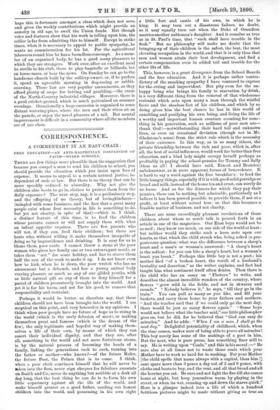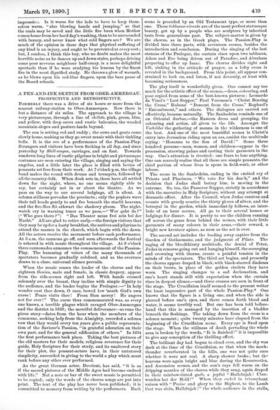CORRESPONDEN CE.
FREE EDUCATION-AN ANTI-MALTHUSIAN CONFESSION OF FAITH-BOARD SCHOOLS.
A COMMENTARY IN AN EASY-CHAIR :
THERE are few things more plausible than the suggestion that because you compel a man to send his children to school, you should provide the education which you insist upon free of expense. It seems to appeal to a certain natural justice, in- dependent of code or law. But there is no theory that can be more speedily reduced to absurdity. Why not give the children also boots to go in, clothes to protect them from the daily exposure ? The next step, nay, it is a preliminary step, and the offspring of no theory, but of lovingkindness- (mingled with some fussiness, and the fact that a great many people exist whose first necessity in life is something to do, but yet not charity, in spite of that)—which is, I think, a distinct feature of this time, is to feed the children whose parents cannot or will not supply them with what an infant appetite requires. There are few parents who will not, if they can, feed their children ; but there are hosts who, without willing it, make themselves incapable of doing so by improvidence and drinking. It is easy for us to blame them, poor souls. I cannot throw a stone at the poor woman who gives her family one or two extravagant meals, or takes them " out " for some holiday, and has to starve them half the rest of the week to make it up. I do not know even how to kick, when he is down, the poor wretch who has no amusement but a debauch, and has a young animal body craving pleasure as much as any of our gilded youths, with as little natural gift as any of them to deny himself for a parcel of children prematurely brought into the world. And yet it is for his harm, and not for his good, to remove that responsibility and restraint.
Perhaps it would be better, as theorists say, that these children should not have been brought into the world. I am sceptical on this point, and very heterodox in my opinions. I 'think when poor people have no future of hope as to rising in the world (which is the early delusion of most), or making themselves great and famous (which is the dream of the few), the only legitimate and hopeful way of making them- selves a life of their own, by means of which they can assert their individual dignity, and that they are, after all, something in the world and not mere fortuitous atoms, is by the natural process of becoming the heads of a family, linking the generations each to each, turning into the father or mother—who knows ?—of the future Ruler, the future Poet, the Prince that is to come. I think, when a poor clerk convinces himself that he will never be taken into the firm, never sign cheques for fabulous amounts on Smith and Co., never do anything but scribble at a desk all day long, that the best thing he can do is to form his own little copartnery against all the ills of the world, and make himself greater as a good father, sending out honest children into the world, and possessing in his own right a little fort and castle of his own, in which he is king. It may turn out a disastrous failure, no doubt, as it may equally turn out when the Duke of Grandton marries another nobleman's daughter. And it remains as true as in St. Paul's time, that " such shall have trouble in the flesh." But no philosophy will make me doubt that the bringing-up of their children is the safest, the best, the most elevating occupation in the world, and that it is only thus that men and women attain their best development, and find a certain compensation even in added toil and trouble for the other ills of life.
This, however, is a great divergence from the School Boards and the free education. And it is perhaps rather contra- dictory of the sneaking sympathy I have ventured to express for the erring and improvident. But pity even for the un- happy being who brings his family to starvation by drink, is a very different thing from the removal of that wholesome restraint which acts upon many a man through the wistful faces and the shoeless feet of his children, and which by so doing gives him the best chance he has in this world of ennobling and purifying his own being, and living the life of a worthy and important human creature counting for some- thing in his generation, such as millions of poor men are— thank God !—notwithstanding their hard toil and unknown lives, or even an occasional deviation (though not in Mr. Gladstone's sense) from the strict rule which is the necessity of their existence. In this way, as in so many others, the private friendship between the rich and poor, which is, after all, the best of social influences, would work far better than free education, and a kind lady might occupy herself perhaps as profitably in paying the school-pennies for Tommy and Sally (bless us all ! I should have said, Ernest and Beatrice) unbeknownst, as in more apparent forms of benevolence. It is hard to say a word against the free breakfasts : to feed the little hungry things, especially if it is with good solid porridge or bread and milk, instead of the home tea and crust, can surely do no harm. And as for the dinners for which they pay their pennies, these can be nothing but admirable, particularly as I believe it has been proved possible to provide them, if not at a profit, at least without actual loss : so that this becomes a feasible matter of business, and not charity.
There are some exceedingly pleasant revelations of those children about whom so much talk is poured forth in an article in one of the magazines. Our Eton boys would not be so naïf ; they know too much, on one side of the world at least : but neither would they strike such a keen note upon our hearts, as that which the child struck who, being asked (a pre- posterous question) what was the difference between a sheep's heart and a man's or woman's, answered : " A sheep's heart is the softest : for you can bite a sheep's heart, but a woman's heart you break." Perhaps this little boy is not a poet ; his mother died "of a broken heart, the result of a husband's brutality and desertion," so the writer explains, and fact had taught him what sentiment itself often denies. Then there is the child who has an essay on " Flowers " to write, and describes the almost incredible wonders of the country, where flowers " grow wild in the fields, and not in sk wares and rounds." " Nobody believes it," he says, " till they go in the train." You can pull as many as you like, and fill your baskets, and carry them home to your fathers and mothers. " And the teacher said that if we could only go the next day, there would be just as many flowers again." " Some boys would not believe what the teacher said," our little philosopher goes on, but he did, for he believed that " God can easy do miracles," And he adds : " When I am a man I shall go the next day." Delightful potentiality of childhood, which, when the time comes, makes sure of being able to prove all miracles ! This boy surely has some of the makings of a poet in him. But the next, who is pure prose, has something finer still to say. He is writing upon "Coals," and this is his moral :—" Be sure also at all times not to waste those coals which your Mother have to work so hard for in washing. For your Mother [the child spells that name always with a capital, bless him !] cant spare more than 3 pence a day out of 2 and 9 pence, with cloths and boots to buy, and the rent, and all that bread and all the herrins you eat. Be sure and not light the fire till she comes home at night, but keep yourselves warm by playing in the street, or when its wet, running up and down the stares quick." Here is a glimpse indeed into a life of which a hundred fictitious pictures might be made without giving so true an
impression. Is it worse for the lads to have to keep them- selves warm, " also blowing hands and jumping," so that the coals may be saved and the little fire burn when Mother comes home from her hard day's washing, than to be surrounded with luxury, and never know what cold fingers are ? We are much of the opinion in these days that physical suffering of any kind is an injury, and ought to be prevented at every cost ; but, I confess; I think this boy, who no doubt makes the most horrible noise as he dances up and down stairs, perhaps driving some poor nervous neighbour half-crazy, is a more delightful spectacle than if he were studying his lessons by the finest fire in the most dignified study. He throws a glow of warmth, as he blows upon his red-blue fingers, upon the bare prose of the Board schools.







































 Previous page
Previous page